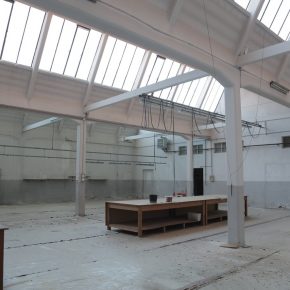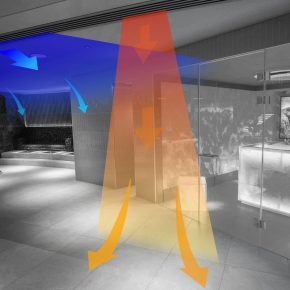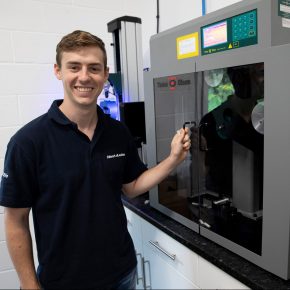
Hemsec: How will buildings change post COVID-19?
There will be a need to repurpose and redesign buildings, as well as increase space as a result of the current global pandemic, according to a growing number of industry insights, explain Hemsec.
The healthcare, pharmaceutical and food industries, all on the front line during the COVID-19 crisis, have already encountered an immediate upsurge in emergency construction for more space.
Belfast City Hospital is a good example; here, an entire tower block has been repurposed – other cases have seen requirements include isolation rooms, clean manufacturing and storage.
These ways of immediately tackling a crisis tend to lead to changes that impact forever; things simply do not go back to how they were.
So, as the situation plays out, there is likely to be a need for greater space, allowing individual workers to distance themselves safely from colleagues and site visitors.
In the food industry, for example, people often work shoulder-to-shoulder, and Klipspringer’s blog, ‘Just How? Social Distancing in Food Factories’ suggests a number of measures to improve safety, including strong ‘Keep your Distance’ signage which demonstrates the need to keep two metres apart.
Klipspringer also suggests factory zoning and physical segregation barriers, all of which could suggest that more space would be an important part of the solution in many factories.
Kerry Foods Insights’ blog ‘6 Lessons from China’s Recovering Food & Beverage Sector after COVID-19’ says there will be more ‘demand for visibility on product sourcing and safety’. and that the industry will be ‘more keenly aware of strict hygiene and food safety’.
Foodnavigator.com says the same in its ‘Market Trends’, ‘Food safety has attracted significant concern from consumers, who want to know whether the coronavirus can be transmitted by imported food…’, which surely will create the need for food producers to take, and promote, measures to allay these fears.
This is very much likely to include the ongoing need to keep individual workers distanced from each other, an area that has not up until now been a necessary consideration in most manufacturing environments.
In the UK over the last few decades, Hemsec believes we, as a nation, have gradually lost a lot of our ability to produce goods in an effort to keep reducing costs.
Many reports suggest there is likely to be a strategic move to rebuild domestic manufacturing in order to improve our self-sustainability, flexibility, and our ability to react to crises in the future.
So, even though for some manufacturers, demand has ‘dropped off a cliff’, leaving them with the same operational costs without the sales in the short term, in the medium-to-long term it is likely that there will be a resurgence in the sector.
Chris Griffin, Commercial Manager at Hemsec, commented: “Whilst automation is going to increasingly develop not all processes can be automated. Manufacturing still requires humans to be part of the process including being physically onsite to run, maintain and repair machines, as well for those processes that a person still needs to do.
“Commercial teams and contractors will still need to come onsite from time to time as well as. This means space management is going to become part of our business continuity planning, not just a nice to have.
“In all of those areas where businesses have critical functions where people need to be involved, including customers, the distances between those people will now need to be reconsidered to plan for a business being able to continue working safely through any similar public health crises in the future.”
Increasingly, organisations may require business continuity facilities and, in some sectors, emergency health centre/isolation rooms, but more than that, many manufacturers may need to expand their buildings to accommodate the increased distancing mentioned above.
Hemsec’s current factory was built using some of its products over 50 years ago and it has been extended over the years. The Hemsec composite panels, both steel and timber faced, are an excellent way to quickly create a dry, temperature stable extension on to a building with fewer civil engineering requirements.
As a manufacturer itself, the company understands the need to have high quality supply readily available, and it is committed to ensuring customers get what they need.
If you foresee a high level of demand, Hemsec are open to get a conversation going now, with a view to developing a supportive supply partnership to meet your needs when the time comes.
You can find Hemsec’s contact details below.
Contact Hemsec:
Stoney Lane,
Rainhill,
Merseyside
L35 9LL
T: 0151 426 7171
E: contact@hemsec.com
Visit Supplier's page
Latest news

1st April 2025
Gilberts Takes Thermal Comfort to New Heights
Gilberts Blackpool is continuing to build on its reputation as a pioneer with the unveiling of ThermaAstute™ – the most extensive range of thermally sensitive diffusers in the market.
Posted in Air Conditioning, Articles, Building Industry News, Building Products & Structures, Building Services, Facility Management & Building Services, Heating, Ventilation and Air Conditioning - HVAC, Innovations & New Products, Restoration & Refurbishment, Retrofit & Renovation, Sustainability & Energy Efficiency
1st April 2025
University of Bath Student Helps Vent-Axia Win Two Environmental Industry Awards
Leading ventilation manufacturer, Vent-Axia, is delighted that the valuable work University of Bath student Roben Els undertook during an industry placement at the company contributed to it winning two environmental industry awards.
Posted in Air Conditioning, Articles, Awards, Building Industry Events, Building Industry News, Building Products & Structures, Building Services, Heating, Ventilation and Air Conditioning - HVAC, Recruitment, Retrofit & Renovation, Sustainability & Energy Efficiency, Training
1st April 2025
Ahmarra: Fire Doors Designed for Hospitals & Healthcare Environments
Ahmarra is a leading UK specialist in fire doors for healthcare environments, having manufactured and installed thousands of bespoke doorsets for NHS hospitals across London and the South East.
Posted in Access Control & Door Entry Systems, Accessibility, Acoustics, Noise & Vibration Control, Architectural Ironmongery, Articles, Building Industry News, Building Products & Structures, Building Services, Building Systems, Doors, Facility Management & Building Services, Health & Safety, Interior Design & Construction, Interiors, Restoration & Refurbishment, Retrofit & Renovation, Security and Fire Protection, Timber Buildings and Timber Products, Wooden products
1st April 2025
Mitsubishi Electric: New intuitive, IoT-ready centralised controller offers instant access to 400 units
Mitsubishi Electric has launched a new user-friendly, touchscreen controller to offer full remote controllability, monitoring and reporting for up to 400 air conditioning units.
Posted in Air Conditioning, Articles, Building Industry News, Building Products & Structures, Building Services, Facility Management & Building Services, Heating Systems, Controls and Management, Heating, Ventilation and Air Conditioning - HVAC, Information Technology, Innovations & New Products, Pipes & Fittings, Plumbing, Posts, Research & Materials Testing, Retrofit & Renovation, Sustainability & Energy Efficiency
 Sign up:
Sign up: